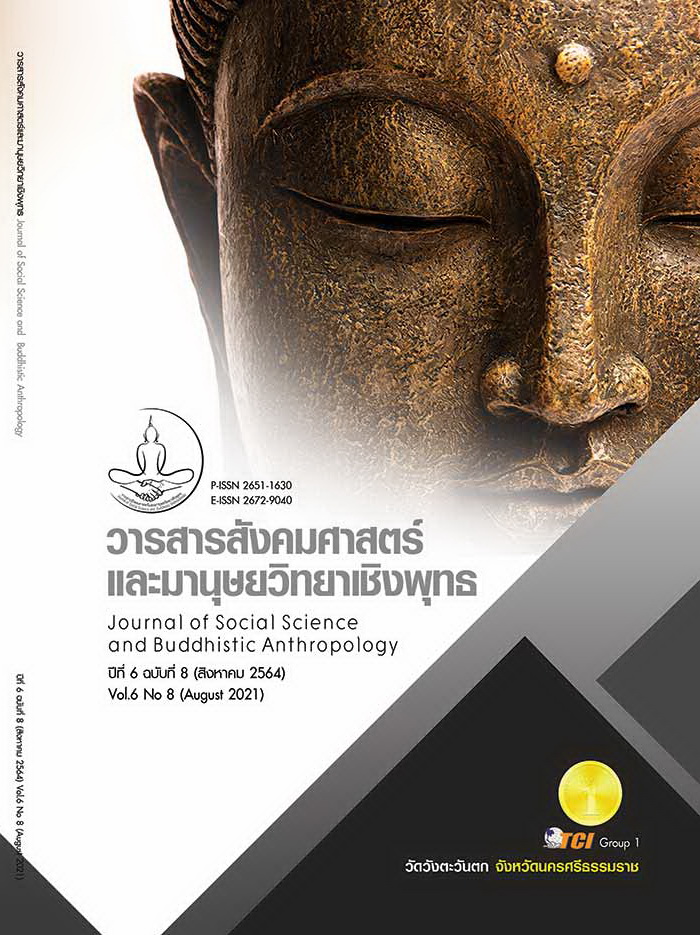THE PROBLEM OF CORRUPTION IN THAI BUREAUCRACY
Keywords:
Corruption, Problem Solving, BureaucracyAbstract
The objectives of this article were to 1) study corruption problems and 2) propose anti-corruption practices in Thai bureaucracy. This is qualitative research by document analysis. Descriptive statistics were used to summarize the research results. The results of the study showed that 1) Corruption problem in Thai bureaucracy is caused by a power structure. Thai society is the relationship between power and power Is a vertical relationship. There will be various behaviors that the authority makes a lot of fraud, It is an act that brings benefits to oneself and others, causing severe damage to the economic, political, social and cultural systems of the Thai people. Corruption occurs to every organization whether it is a group of politicians, local politicians, and government officials of all agencies all local across the country. In which these groups of people They are a group of people who have the power to approve projects and budgets to benefit their own groups rather than to benefit the people, society, and nation. 2) Anti-Corruption Guidelines, the National Counter Corruption Commission should have a chapter and duty that both prevent the commission of offenses by raising awareness of youth at all levels in the education system and the non-educational system build engagement with the community government agencies and private sectors with reward incentive systems tax system. In the suppression of corruption, the Anti-Corruption Commission should allocate sufficient manpower to meet the number of cases and there should be incentives for achievement in work, prosecution must be swift and serious, and the punishment for offenders should be more severe.
References
บีบีซี นิวส์ ไทย. (2562). คอร์รัปชัน: อันดับความโปร่งใสไทย ปี 2562 ร่วงทั้งระดับโลกและอาเซียน. เรียกใช้เมื่อ 28 พฤศจิกายน 2563 จาก http://www.bbc.com/thai/thailand-51217494
ประเวศ วะสี. (2547). เราจะป้องกันแก้ไขปัญหาการทุจริต คอร์รัปชันในยุคปฏิรูปกันอย่างไร. กรุงเทพมหานคร: สมาคมข้าราชการพลเรือนแห่งประเทศไทย.
พระราชบัญญัติประกอบรัฐธรรมนูญว่าด้วยการป้องกันและปราบปรามการทุจริต พ.ศ. 2561. (2561). ราชกิจจานุเบกษา เล่มที่ 135 ตอนที่ 52 ก (22 กรกฎาคม 2561).
รพีพรรณ สุวรรณณัฐโชติ. (2550). สังคมวิทยา. สงขลา: ไทยนํา.
วราคม ทีสุก. (2544). สังคมและวัฒนธรรมไทย. กรุงเทพมหานคร: พัฒนาศึกษา.
วิทยากร เชียงกุล. (2549). แนวทางปราบคอร์รัปชั่นอย่างได้ผล: เปรียบเทียบไทยกับประเทศอื่น. กรุงเทพมหานคร: สำนักพิมพ์สายธาร.
วิทยากร เชียงกุล. (2550). สภาวะการศึกษาไทย ปี 2549/2550 การแก้ปัญหาและการปฏิรูปการศึกษาอย่างเป็นระบบองค์รวม. กรุงเทพมหานคร: สำนักงานเลขาธิการสภาการศึกษา.
สุธี อากาศฤกษ์. (2539). องค์ความรู้ว่าด้วยการทุจริตและประพฤติมิชอบในวงราชการไทย. ใน รายงานการวิจัย. สำนักงานคณะกรรมการป้องกันและปราบปรามการทุจริตและประพฤติมิชอบในวงราชการ.
อุดม รัฐอมฤต. (2544). การแก้ไขปัญหาการทุจริตในระบบการเมืองและวงราชการไทย. กรุงเทพมหานคร: กองการพิมพ์ สำนักงานเลขาธิการสภาผู้แทนราษฎร.
Turmet, J. H. (1996). Conflict in Organizations. Prentice-Hall. Englewood Cliffs: New Jersey.









